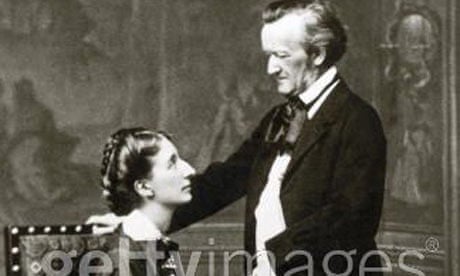This is a tale with scarcely a decent human being in it. Joachim Köhler, a recent biographer of Richard Wagner, gets to the nub of the matter when he is quoted on the dust jacket of this biography of the composer's widow saying that Hilmes's book is "final proof of the intrinsic connection between Wagner and Hitler. The link is Cosima".
Cosima had many surnames in her long lifetime. She was born in Como in 1837, the illegitimate daughter of the Hungarian Franz Liszt, the most celebrated virtuoso pianist of the 19th century, and his mistress, a French writer, the Countess Marie D'Agoult. Cosima's parents sent her and her sister to France to be brought up by her mother's own strict governess, the 72-year-old Madame Patersi; we would nowadays find her rod-of-iron rules a kind of child abuse. This hard aristocratic regime was softened only by Cosima's contact with her paternal grandmother. This parentless childhood was made worse when Liszt split from their mother and in 1847 took up with the terrifying, Polish-born Princess Carolyne von Sayn-Wittgenstein.
The Patersi rules meant that poor Cosima was brainwashed into thinking that the point of her life was guilt, to atone for the sins and deviations of her parents. Hilmes is reluctant to say this made Cosima masochistic, because the term is anachronistic (coined only in 1886), because "she was not sick" and because what he calls her self-harming "personality disorder" was not sexually motivated. Here Stewart Spencer's translation shows signs of haste, for a few lines down we read of "Cosima's masochistic personality disorder".
Cosima revelled in self-abasement, being humiliated and being in the wrong. At the same time, she learned to give as good as she got and it seems from her earliest diaries that her default position was antisemitism.
Cosima knew when she married him in 1857 that she did not love the aristocratic German musician Hans von Bülow. Seven years and two daughters later, she left him for Wagner, who was already famous and enjoying the patronage and passionately platonic love of the homosexual King Ludwig II of Bavaria. The next year, she had her first child by Wagner, Isolde; two years later she had her second, Eva (who later married the Nazi sympathiser Houston Stewart Chamberlain); and then finally, to everyone's relief, in 1869 she had a boy, Siegfried. Wagner needed an heir to run the Bayreuth festival . In 1870, they were able to marry.
Until the death of her husband in 1883, Cosima lived only for Richard, and presided over his cult until her death in 1930, aged 92. But she insisted that her other children's lives were subordinated to "Fidi", Siegfried. Eventually, the young man agreed to a career in music, became a competent conductor and a second-rate composer. Though known by the inner circle to be homosexual, Siegfried, aged 46, married a 17-year-old, Winifred Williams, born in Hastings, and they had four children, including the talented Wieland, who ran the festival for many years and had some success in de-Nazifying it, and the distinctly untalented Wolfgang, who ruled with increasing senility until a few years before his death in March this year.
Though no one has ever proved they were lovers, Winifred and Hitler were certainly attracted to each other. Hitler only absented himself from appearing publicly at the festival from 1926 to 1933 to prevent it being harmed; he continued to visit Bayreuth secretly, where Siegfried and Winifred's boys called him Uncle Wolf and he told them hair-raising bedtime stories (and, Wieland told one writer, molested him).
Is Cosima's antisemitism the missing link between Wagner and Hitler? Despite the Köhler quotation, Hilmes thinks not. He follows the German writer Dieter David Scholtz in distinguishing between Cosima's mindless antisemitism and her husband's capacity for "revising his views". That is, as in the case of Hermann Levi, the rabbi's son who was his choice to conduct Parsifal, Wagner showed he could learn from his mistakes and though "Wagner was equally capable of vulgar and completely unforgivable remarks about Jews" in terms of "their narrow-mindedness, their simplicity and their credulity, Cosima's views were in a class apart from Wagner's". Not, however, from her daughter-in-law's: in a story full of fiends, Winifred is easily the nastiest.

Comments (…)
Sign in or create your Guardian account to join the discussion